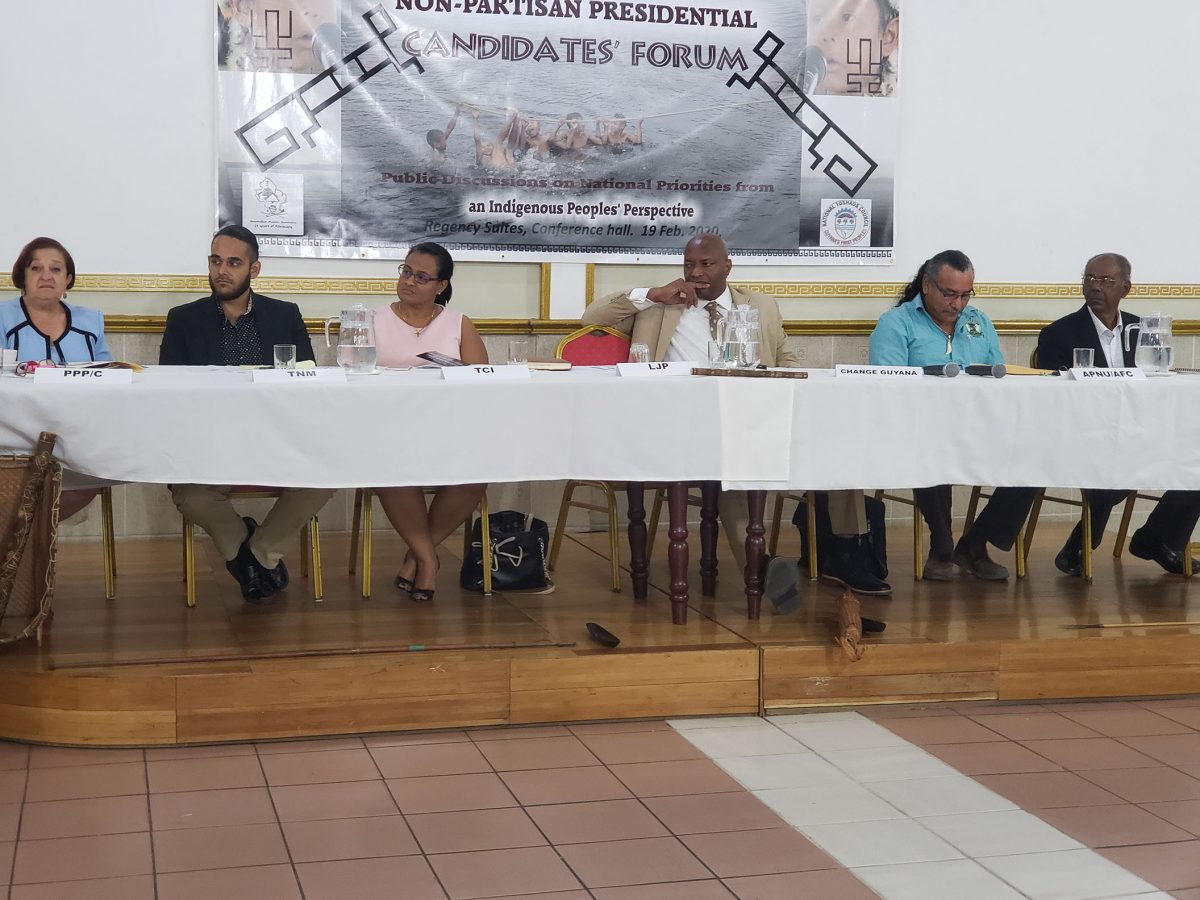The Amerindian Peoples Associations (APA) in collaboration with the National Toshaos Council (NTC) yesterday presented a list of their concerns to political parties contesting the March 2nd General and Regional elections and land titling and revision of the Amerindian Act are key areas.
The list was presented during a non-partisan Presidential Candidates’ Forum hosted by the APA and NTC at the Regency Hotel. Representatives of the political parties in attendance included presidential candidates of the Citizenship Initiative and A New and United Guyana, Rondha-Ann Lam and Ralph Ramkarran, respectively, along with the People’s Progressive Party/Civic member, Gail Teixeira, Chairman of Change Guyana, Nigel Hinds, representative of The New Movement (TNM), Daniel Khanai and Mervyn Williams, who represented A Partnership for National Unity and the Alliance for Change.
Included on the list of concerns is the Amerindian Act revision. According to the Youth representative of the APA, Sherwyne Krammer, although the 2006 revision was progressive, much is still needed to be done in that regard. He stated that over the past year, the APA and NTC have submitted consolidated recommendations outlining areas that need to be changed in order to ensure that the rights of indigenous peoples are recognized.
Some of the changes to the Amerindian Act that they suggested are that NTC must be recognized as an independent entity by the government and be able to act as an advisory body to any Ministry that will be making decisions involving Indigenous Peoples. In addition to that, they requested that the NTC have access to funds so that it can effectively perform its duties.
Krammer further stated that the act must require Government agencies, extractive businesses and other persons to engage in meaningful consultations with affected Indigenous Peoples to obtain their Free, Prior and Informed Consent (FPIC) before granting concessions, leases or other land rights on any of the village’s traditional lands whether or not the said land is titled. In addition, he stated, the act must include that extractive royalty funds are to be managed by an independent board of Indigenous representatives, which will be appointed by indigenous organizations like District Councils and the NTC.
Another issue included on the list is Land Titling. “The unjust history of loss of lands and compromises (of) land tenure security must be changed,” Krammer stated, before adding any government’s policy must recognize and respect indigenous Peoples’ right to their traditional lands and territories. He added that the APA and NTC are looking forward to support a renewed Amerindian Land Titling project and its funding should be renewed until the job is complete. Further, he said, a permanent titling unit within the Ministry of Indigenous Peoples’ affairs must be established.
“Securing our lands doesn’t negatively impact other Guyanese, but helps us all to grow sustainably while protecting our environment,” he said, before adding that they are aware of increased pressure for infrastructural development through the lands that Indigenous Peoples have protected for a millennia, especially since oil drilling has commenced in the country. “We must therefore be recognized as equal partners in holding our commitments to a green state and low carbon economy,” Krammer stated.
In addition, Krammer, disclosed that the APA and NTC are requesting that a robust and institutionalized process of the right to FPIC is established. “For too long Indigenous Peoples have been subjected to partial information sharing or brought on board to sit at the table too late in the process to make an impact. This will benefit all Guyanese by reducing conflict and delays around poorly designed projects and ensuring that projects that do move forward are sustainable and aligned with the needs and vision of our people,” he said.
The final request on the list is that District Councils should be recognized and their participation in indigenous peoples’ affairs must be increased. The representatives of the political parties were not given a chance to respond to those requests.









